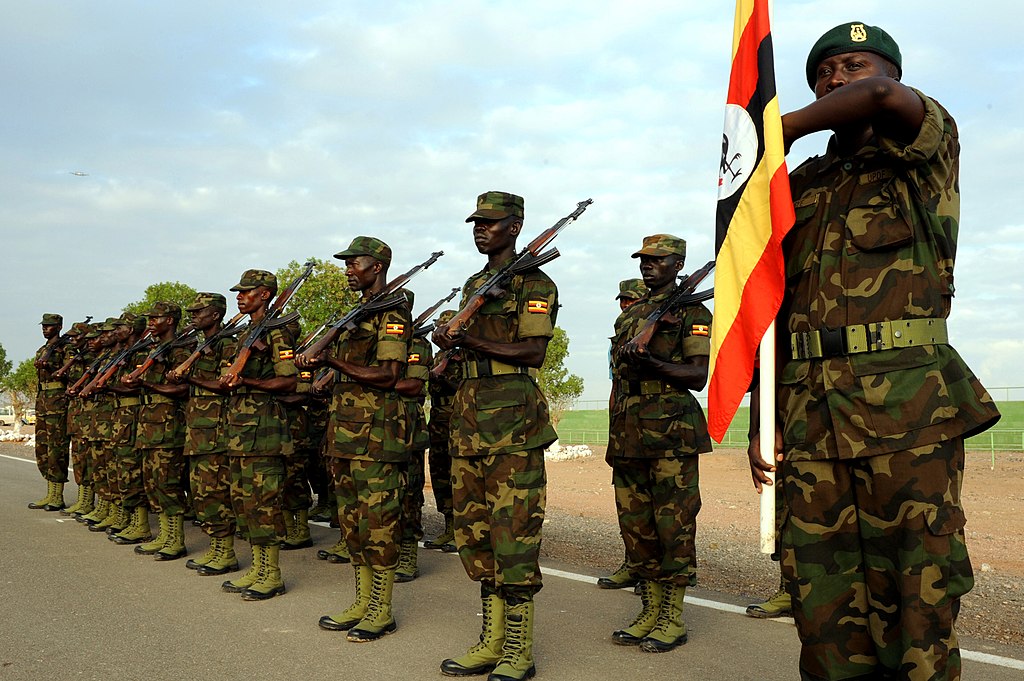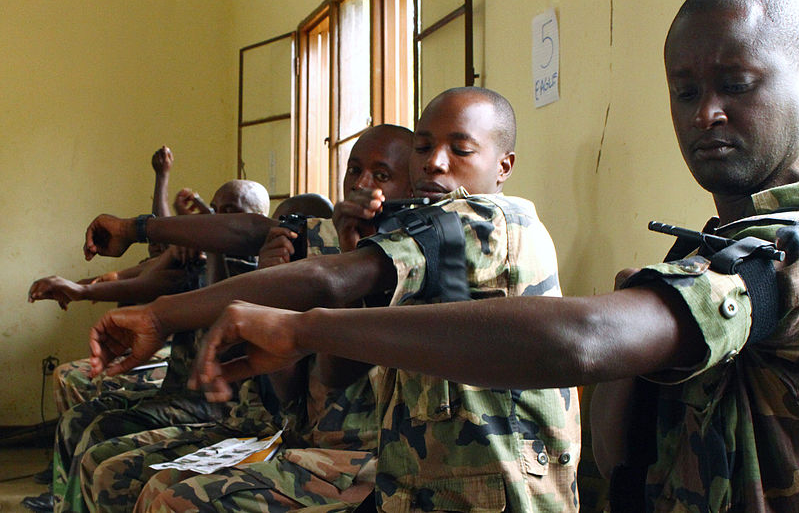
Ugandan soldiers on parade.
“In order to fight them more effectively, our two countries [Uganda and DRC] have recently agreed to pool their efforts in order to carry out joint operations against this common enemy.”
The first accompanying excerpt from the Rwanda-centric media outlet taarifa.rw discusses the continued counterterrorism collaboration of Rwanda’s neighbors, Uganda and the Democratic Republic of the Congo (DRC). The cooperation is meant to combat militants loyal to the Islamic State in Iraq and Syria (ISIS) in the insurgent Allied Democratic Forces (ADF), based in the DRC. According to the article, the two countries’ forces have opened a second axis for launching an offensive against the ADF. The article notes that originally Uganda entered the DRC with the DRC government’s permission because the ADF conducted two bombings in Kampala, but Uganda has increased coordination with the DRC to more effectively combat the ADF.
The second accompanying excerpt from the Ugandan publication pulse.ug also emphasizes a retaliatory objective for Uganda’s latest troop deployment to the DRC. Besides the ADF’s bombings in Kampala, the group also began attacking markets located near Uganda’s northern border with the DRC. After the ADF stole food and medicine and retreated, numerous displaced people crossed into Uganda, which created an additional humanitarian crisis for Uganda. Further, the article notes the Ugandan army suspected that ADF members were operating in Uganda by disguising themselves as refugees. This incentivized Uganda to enter the DRC to push the ADF back from the border.
As the final excerpt from the pro-government Rwandan daily newtimes.co.rw notes, there is a growing perception that the conflict in the DRC is now a regional affair. According to the article, Rwandan President Paul Kagame is calling for collective regional military action to combat the ADF and the Rwandan government is opening lines of communication with Uganda to resolve their border issues as another means to address the ADF’s regional threat. In addition, the article mentions Rwanda’s increasing collaboration with Burundi to target other militia groups besides the ADF, and with Mozambique to combat ISIS-loyal militants in that country. This suggests that Rwanda is increasingly acquiring regional military influence.
Source:
“Uganda Sends More Troops To DRC,” taarifa.rw (Rwanda-centric media outlet), 3 February 2022. https://taarifa.rw/uganda-sends-more-troops-to-drc/
Uganda’s government says it has sent an extra number of troops into neighbouring Democratic Republic of Congo to bolster its fight against the Allied Democratic Forces rebels. Last year in November, thousands of [Ugandan] troops crossed into DRC on invitation by President Félix Tshisekedi to “fight against armed groups, in particular the Ugandan rebels of the ADF”. Uganda gladly accepted the invitation and responded by conducting aerial and artillery bombardment of ADF bases deep in the jungles of DRC.
The attacks in October and November [2021] prompted the Ugandan military to deploy in eastern DRC in late November to take on the Islamist fighters.
Source: “Thousands of refugees flee into Uganda after an ADF attack,” pulse.ug (Ugandan publication covering Ugandan affairs for a global readership), 7 February 2022. https://www.pulse.ug/news/thousands-of-refugees-flee-into-uganda-after-an-adf-attack/522ex8c
Uganda’s Minister of State for Relief, Disaster Preparedness and Refugees, Esther Anyakun, said that the ADF reportedly broke into pharmacies and shops as residents fled at their approach. The rebels allegedly made off with food and medicine. The refugees that crossed into Uganda were registered by Uganda Red Cross with the help of the Office of the Prime Minister and The United Nations High Commissioner for Refugees (UNHCR. Only days before this fresh influx of refugees, residents in Bundibugyo and Ntoroko districts were advised not to accommodate refugees fleeing battle in the Democratic Republic of Congo. These refugees, Ugandan authorities said, would have to be reported to the Refugees’ Reception Center and be registered.
Source: “Security problems in DR Congo affect the whole region,” newtimes.co.rw (pro-government Rwandan daily), 8 February 2022. https://www.newtimes.co.rw/news/security-problems-dr-congo-affect-whole-region-kagame
President Paul Kagame has called for collective efforts by regional leaders towards the end of security challenges in the Democratic Republic of Congo, mainly associated to armed militia groups based in the country. He said that Rwanda was ready to play her part in resolving the security challenges stemming from the neighbouring country. The head of state also weighed in on Rwanda’s ties with neighboring countries, which he said were on a promising trajectory.
Image Information:
Image: Ugandan soldiers on parade.
Photographer: Master Sergeant Carlotta Holley
Source: https://commons.wikimedia.org/wiki/File:Ugandan_soldiers_on_parade.jpg
Attribution: CC x 2.0

